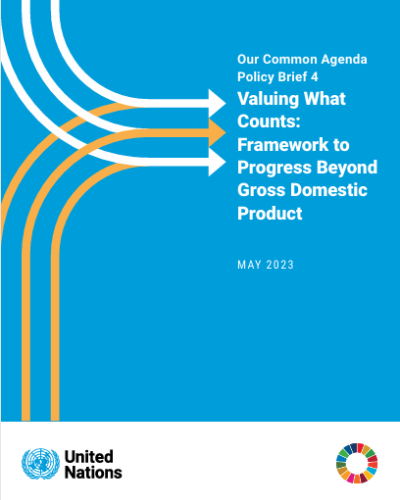Our Common Agenda Policy Brief 4 - Valuing What Counts: Framework to Progress Beyond Gross Domestic Product

In the 2030 Agenda for Sustainable Development and Our Common Agenda, it is recognized that a harmful anachronism exists at the heart of global policymaking, which is that our economic models and measurements overlook many aspects that sustain life and contribute to human well-being, while perversely placing disproportionate value on activities that deplete the planet. The intention of the proposals presented in the present policy brief is not to replace gross domestic product but to outline a path to develop complementary metrics in which what matters to people, the planet and the future is more fully recognized.
Today, the world is facing catastrophic and interconnected crises – including climate change, deteriorating ecosystems and biodiversity loss, devastating conflicts and violence, increasing poverty, hunger, inequalities, unsustainable debt burdens and heightened costs of living – which show no sign of abating. The Sustainable Development Goals are badly off-track. Gross domestic product (GDP) has become a proxy for how we determine value, how we measure wealth creation and development progress and how we allocate resources on that basis.
As mentioned in paragraphs 38 and 39 of my report entitled “Our Common Agenda” (A/75/982), GDP does not account for human well-being, environmental sustainability, unpaid household ser vices, such as care work, and the biased distributional dimensions of economic activity. Moreover, it fails to capture the human and environmental destruction of some economic activities. Harmful practices, such as deforestation, overfishing and the burning of fossil fuels, often contribute to increases in GDP. To achieve the targets that we have set to address the triple planetary crisis and other crises, a fundamental shift in how we measure progress is urgently needed.
Discussions on moving beyond GDP have been under way for decades.1 These efforts have laid the foundation for establishing a shared language and community of practice to go beyond GDP. Examples of recent initiatives include:
a) The 2030 Agenda for Sustainable Development and the Sustainable Development Goals, with their economic, social and environmental dimensions;
b) The United Nations Development Programme human development index, which supplements GDP with measures of well-being and agency, inequality and multidimensional poverty and takes into account the interconnectedness of socioeconomic and planetary systems.
c) Gender-specific indicators across thematic areas that go beyond the Goals and adequately measure and compare the situation of women and men in all areas of life, including measures of time spent on unpaid care and domestic work and its distribution and economic value, along with other measures, such as the social and economic cost of violence against women;
d) Work focused on inclusive growth and efforts to go beyond GDP undertaken by the Organisation for Economic Co- operation and Development, the Europe an Commission, the World Bank and the International Monetary Fund; e) Measures of environmental degradation and depletion, environmental and economic accounting and measures of inclusive or comprehensive wealth by the United Nations Environment Pro gramme and the World Bank.
Of these initiatives, the Sustainable Development Goals and their indicators, universally adopted by Member States, were consciously crafted to address the shortcomings of GDP. Indeed, the Goals and their indicators are the most comprehensive “Beyond GDP” framework agreed to and measured today. Moreover, in target 17.19 of the Goals, Member States are specifically called upon to build on existing initiatives to develop measurements of progress on sustainable development that complement GDP and support statistical capacity-building in developing coun tries by 2030.
This call was taken up in Our Common Agenda and in the report of the High-level Committee on Programmes entitled Valuing What Counts: United Nations System-wide Contribution on Progress Beyond Gross Domestic Product,3 which serves as the technical foundation for the present policy brief. The brief is also aimed at building on ongoing processes, including the multi-year update of the 2008 United Nations System of National Accounts4 by 2025 and the implementation of the System of Environmental-Economic Accounting and the System of Environmental-Economic Accounting – Ecosystem Accounting.




















